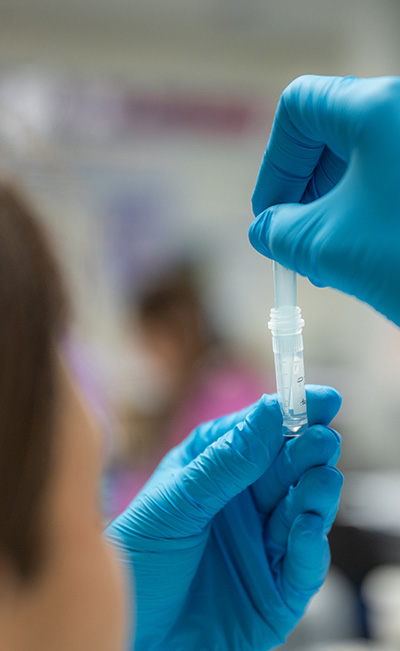- Augusta University
- College of Allied Health Sciences
- Allied Health Professions
- Clinical Laboratory Science
- Clinical Laboratory Science
Clinical Laboratory Science
Clinical laboratory profession has diverse and multi-level functions in the areas of analysis and clinical decision-making, information management, regulatory compliance, education, and quality assurance / performance improvement wherever laboratory testing is researched, developed or performed.
The clinical laboratory scientist / medical technologist is an allied health professional who is qualified by academic and practical training to provide service in clinical laboratory science. The clinical laboratory scientist / medical technologist must also be responsible for his/her own actions, as defined by the profession.
The ability to relate to people, a capacity for calm and reasoned judgment and a demonstration of commitment to the patient are qualities essential for a clinical laboratory scientist / medical technologist. They must demonstrate ethical and moral attitudes and principles, which are essential for gaining and maintaining the trust of professional associates, the support of the community, and the confidence of the patient and family. An attitude of respect for the patient and confidentiality of the patient's record and/or diagnoses must be maintained.
Competencies
Upon graduation and initial employment, the clinical laboratory scientist / medical technologist will demonstrate entry-level competencies in the following areas of professional practice:
- Developing and establishing procedures for collecting, processing, and analyzing biological specimens and other substances
- Performing analytical tests on body fluids, cells, and other substances
- Integrating and relating data generated by the various clinical laboratory departments while making judgments regarding possible discrepancies
- Confirming abnormal results; verifying quality control procedures; executing quality control procedures, and developing solutions to problems concerning the generation of laboratory data
- Making decisions concerning the results of quality control and quality assurance measures, and instituting proper procedures to maintain accuracy and precision
- Establishing and performing preventive and corrective maintenance of equipment and instruments as well as identifying appropriate sources for repairs
- Developing, evaluating, and selecting new techniques, instruments, and methods in terms of their usefulness and practicality within the context of a given laboratory's personnel, equipment, space, and budgetary resources
- Demonstrating professional conduct and interpersonal communication skills with patients, laboratory personnel, other health care professionals, and with the public
- Establishing and maintaining continuing education as a function of growth and maintenance of professional competence
- Providing leadership in educating other health personnel and the community
- Applying principles of educational methodology
- Applying principles of current information systems
Career Entry Description
At career entry, the clinical laboratory scientist/medical technologist will be competent in performing the full range of clinical laboratory tests in areas such as hematology, clinical chemistry, immunohematology, microbiology, serology/immunology, coagulation, molecular, and other emerging diagnostics, and will play a role in the development and evaluation of test systems and interpretive algorithms. The clinical laboratory scientist/medical technologist will have diverse responsibilities in areas of analysis and clinical decision-making, regulatory compliance with applicable regulations, education, and quality assurance/performance improvement wherever laboratory testing is researched, developed or performed. The clinical laboratory scientist/medical technologist will also possess basic knowledge, skills, and relevant experiences in:
- Communications to enable consultative interactions with members of the healthcare team, external relations, customer service and patient education
- Financial, operations, marketing, and human resource management of the clinical laboratory to enable cost-effective, high-quality, value-added laboratory services
- Information management to enable effective, timely, accurate, and cost-effective reporting of laboratory-generated information
- Research design/practice sufficient to evaluate published studies as an informed consumer

Registration / Licensure Disclosure Statement
Students of Augusta University Clinical Laboratory Sciences (CLS) Program may obtain registration in Georgia and South Carolina after passing the CLS/CLT national certification. This certification examination allows one to apply for registration or licensure in any state. This examination is administered by the American Society for Clinical Pathology (ASCP).
For specific information regarding states that require licensure, students may visit the ASCLS website.